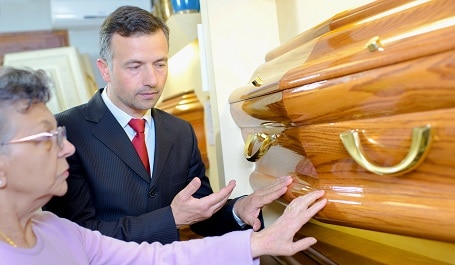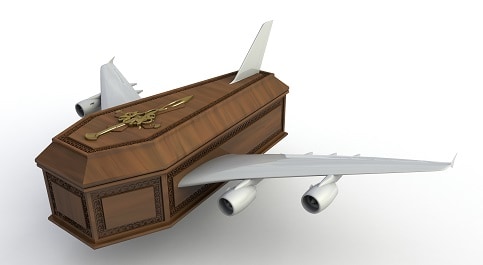In the unfortunate event that a family member passes away when they are overseas, getting the body home for the burial can be difficult.
Flying is the obvious choice of transport, but you may be wondering, ‘Where do they store the coffin (casket) on the plane?’
- Coffins are stored in the cargo area of a passenger or cargo plane.
- A funeral director is required to place the deceased in a specialized container.
- It is essential to work with a funeral director at each end of the trip.
- Many regulations govern transporting a deceased body.
The two essential services you will require are the assistance of the airline to book and manage the transportation of the coffin, and the help of a funeral director to ensure all the transporting requirements and documentation are adhered to.
Coffins Are Kept in the Cargo Area
Cargo planes and passenger aircraft share one fundamental difference – the type of things that they transport. The choice of plane depends on the space available for cargo, but the regulations are the same.
- Passenger planes carry mostly people with an allocated amount allowed for minimal luggage in the hold/cargo area.
- Aircraft with passengers can only take a set amount of cargo, so it may take some ringing around to find a plane with enough space free for a casket.
- The beauty of transporting the coffin via a passenger plane is that the relative(s) can travel with the body, albeit in another part of the plane.
- In modern passenger planes, the lower cargo area (which is located below the passenger floor) is pressurized with some areas (which is where pets are stored while traveling) the temperature of approximately 28.4 Fahrenheit
- Other areas in the hold can drop a further 20 or more degrees F. which is where a coffin would be stored.
- Cargo planes have very limited seats for crew or the odd passenger or two, but they have a huge empty galley that can be rearranged or manipulated to handle a wide range of cargo.
- Cargo planes have rollers and latches in the floor and walls designed to keep the cargo from moving around.
- The conditions within a cargo plane are somewhat similar all over, although they do have containers that can be heated if necessary. For medical purposes, they can be cooled to the appropriate temperature required.
It Requires Organization by a Funeral Director

You simply cannot make arrangements to send a dead body in-flight on your own.
When organizing to move a deceased person, you must work with a ‘Known Shipper’- a funeral director who has the designation position for this situation.
Legally it must be a known shipper who will arrange the shipping of the body and they will handle the paperwork.
- You will need a known shipper funeral director to arrange to get it onto the plane and sent from a state or country.
- They will organize the death certificate which will be needed by the airline.
- Some countries require the body to be embalmed before transportation.
- They will arrange for the purchase of an air tray from the flight provider which is a special container into which the coffin is encased.
- The known shipper will liaise with the coroner to obtain the vital documents required for transporting the coffin by air.
A Second Known Shipper is Required On Arrival.
You will also need a second known shipper to handle the arrival and disbursement of the coffin at the end of the journey.
- Once again, they will arrange and manage the paperwork when receiving the coffin.
- They will liaise with the flight staff regarding removing the coffin from the hold or cargo bay.
- They will transport the coffin to the funeral home until the time of the internment.
It can be a stressful and expensive experience to move a dead body from one place to another via air travel.
You will find that the medical and air-carrier authorities are compassionate, and they will try to make the whole process as smooth as they possibly can.
But there are many rules and regulations regarding transporting a dead body, and they have to be completed to the authority’s satisfaction before they can proceed to move the coffin anywhere.
Always check on the deceased insurance policy as people often take out travel insurance that has allowances for this situation.
Top Points for Transporting a Coffin By Air.

- You will need a funeral director (a known shipper) at both the departing and arrival locations to assist you to move the body.
- The coffin/body will be stored in the cargo or hold area of the plane.
- A dead body is required to be transported in a secure coffin and then encased in an air-tray.
- Air-trays must be new, they cannot be reused.
- Air shipping of a body can be expensive. Check whether the deceased had travel insurance and if so, contact them to let them know what has happened. Often they will do all the organizing for you.
- Some states or countries may require the body to be embalmed or refrigerated before flying out or entry.
- Regulations between countries vary widely. Your known shipper will be familiar with these. You can also contact the embassy or consulate in the country the deceased was visiting for more information.
- A death certificate registered in the country the deceased passed away in will be required. Confirmation from a doctor that the person is deceased is also required.
- Please note – anything transported from one country to another must go through security and X-ray checks, and this requirement covers coffins as well. Do not put anything metallic in the coffin or you may be delayed by security. Your funeral director will help you to ensure the coffin and body comply with regulations.
- Because of security requirements, no personal items may be put inside the coffin with the remains. Personal effects should be shipped separately.
- All international paperwork must be easily accessible for the Airline staff and any receiving staff. Paperwork must move with the remains in a document pouch on the outside of the container. It cannot be carried by family members who are escorting the coffin or placed inside the coffin.
Where Body is Stored if Someone Dies on a Flight?
Thankfully this doesn’t happen too often. If someone gets into a medical emergency, the flight staff are thoroughly trained to deal with medical issues.
- If possible, the flight will be diverted to the nearest suitable airport, and the captain will request medical help. If there is a doctor or nurse on board they will be called on to help.
Should the worst happen;
- The deceased passenger’s body will be moved to an empty row of seats if possible.
- The body is often moved into the business class away from the other passengers if space is available.
- Regardless of where they are moved or whether they have to remain where they are, the body is covered completely by a blanket to preserve the dignity of the deceased.
Final notes
As stressful as it is to have to recover a loved one who has died overseas, there are many compassionate professionals to help you through the mountain of paperwork.
- Although you want to get the body home as soon as possible, understand that officials are doing their best to help you and that the body can only be released to fly once all the paperwork has been completed.
- Your funeral directors are your best allies. They know what is needed, and they can guide you through the maze of regulations.
- It is always a comfort to finally get the deceased home so that family and friends can pay their final respects and the deceased can finally be laid to rest.
- As with most things, knowledge is power. If you should ever need to fly a deceased person from one state or country to another, find out everything you need to do.
Use your funeral director extensively; they have the experience and they know what is required. The quicker you can help them, the quicker they can help you.

Resources
https://www.funeralwise.com/2019/01/16/shipping-a-dead-body-10-things-you-need-to-know/
https://www.flyertalk.com/forum/travelbuzz/1146980-what-do-they-do-coffins.html
https://oureverydaylife.com/how-to-fly-a-dead-person-home-12525899.html
https://wilsonsfuneraladvice.com/where-coffin-ships/
https://www.everplans.com/articles/how-to-transport-a-body-via-airplane
https://funeralcompanion.com/air-transportation-dead-bodies/

